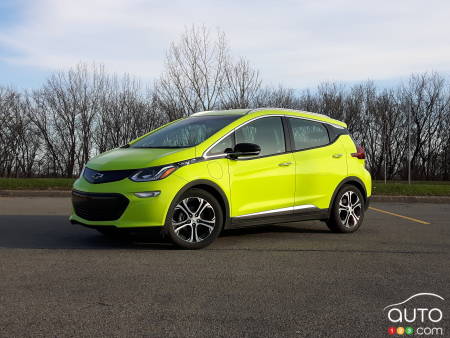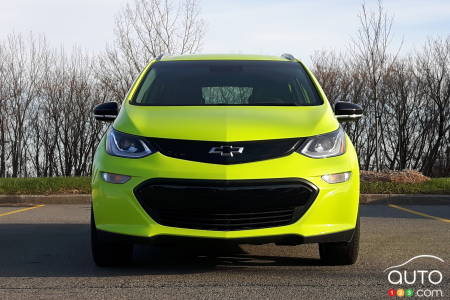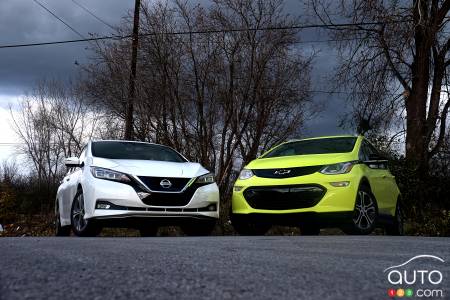It was a bold, risky move: Back in 2011, Nissan was the first automaker with the gumption to jump right past the hybrid-car phase and go straight to all-electric. Autonomy wasn’t extraordinary, but fans of electric cars had something to cheer about, and the LEAF’s success was immediate.
Chevrolet was also innovative, and relatively successful, with the Volt, a car that included a gas engine working in tandem with an electric motor. General Motors did wait until 2017 to present an all-electric model, but the upside of the delay was that the new Bolt could deliver a superior range of 383 km. The car quickly became the darling of the EV community.
Nissan, caught a bit behind with the more-limited range of its LEAF, fights back in 2019 with 363 km of autonomy for the new LEAF+.
2019 Chevrolet Bolt
The Bolt was the first electric car to hit the market that combined long battery range and a realistic price point; success was perhaps inevitable. For sure, when the small car arrived as a 2017 model, its $43,000 price was nothing to sneeze at, but the promise of 383 km of autonomy made it an attractive proposition. Given the frenetic pace of innovation in the current automotive universe, however, its advantage on this front lasted all of two years. The Bolt now has a lot of competition, starting with the Hyundai Kona and IONIQ, the Kia Soul… and the old-timer of the bunch, the LEAF.
City dweller
It’s no sports car, but the Bolt offers the equivalent of 200 hp and a 0-100 km/h time of 6.5 seconds - enough to elicit a smile or two when pushing the accelerator. The Bolt chassis sits literally on top of the battery pack, which has a flat design to allow it to reside under the floor. This provides the car with a low centre of gravity and thus above-average agility.
The Bolt’s hatchback design allows it to offer decent cargo space of 478 litres with the rear seats in place (and over 1,600 with them folded flat), which is very generous for a vehicle of this size. Enough space for luggage, but small enough to scoot around town in.

LT or Premier
The LT versions come with such features as HID headlights, daytime running lights and LED tail lights, 10.2-inch infotainment touchscreen with Android Auto and Apple CarPlay, automatic climate control, digital instrument cluster, passive keyless entry, remote starter and manual front seats with fabric cover. Options include the Driver Confidence Group II package, which gets you forward collision warning with low-speed auto brake and front pedestrian brake, lane assist with lane departure warning and automatic high beam.)
The Premier version includes body-colour exterior mirrors, chrome exterior trim, 360-degree rearview camera, blind spot monitoring and lane departure warning.
On the road
Let's start with the positives. The power of the Bolt is good, very good even. That time of 6.5 seconds to get to 100 km/h is impressive. And despite its compact size, interior space is good because of the high roof. Handling is good, although when we dig we find the suspension is too stiff, and the low-resistance tires it comes with translate into lesser grip. These two together makes that it doesn’t take much to make the car dance and the brakes are not as efficient as they should be, lacking proper power to stop this small but heavy vehicle.
Consult our listing of pre-owned Chevrolet vehicles available in your region of Canada

2019 Nissan LEAF+
Since introducing the EV globally in 2011, Nissan has sold more than 400,000 LEAFs worldwide. It’s an impressive figure considering that the electric vehicle industry is still in its infancy. For 2019, Nissan introduces the LEAF+, a more-advanced and longer-range version of the first-generation LEAF.
Improved range
The original LEAF’s 242 km of autonomy that had made EV fans so excited just a few years ago became, in the past two years or so, simply insufficient; Nissan had to make adjustments.
The new LEAF+ offers 363 km in the S version and 349 km in the SL and SV editions. The battery capacity ranges from 40 kWh to 62 kWh, and power from 147 hp to 214. It’s also now possible to use a Level 3 charger that gives 80% charge in just 20 minutes.
For those who want to pay a little less, there’s the SV version with the old 40 kWh generator that delivers 242 km of range; it’s priced at $ 40,698. For the LEAF+, the offer starts at $43,698 for an S+ version and $49,698 for an SL+.
Now, time for a bit of math. To the sale price you add taxes, transport and preparation. Then you subtract $5,000 thanks to the new federal incentive; if you live in Quebec or B.C. you can also subtract $8,000 or $5,000 more under those provinces’ programs, respectively. In that case your final total will be around the $40,000 mark, which is close to what Chevrolet is asking for the Bolt.
More embedded technology
The LEAF+ also features mora advanced technologies on board. The central multimedia screen has grown from seven to eight inches and comes standard with Apple CarPlay and Android Auto integration. Also standard on the base version are new 16-inch wheels, keyless entry, automatic climate control, heated front and rear seats, four-way driver and front passenger seat settings and heated, leather-wrapped steering wheel.
Advanced security features are included in the SV and SL models, which receive a blind spot monitoring system, rear cross traffic alert and lane departure warning. There’s also the ProPilot Assist system, which reduces driver stress in busy areas by keeping the car centered in its lane and at a safe distance from the vehicle ahead.
More pep
The additional horsepower and torque bring beneficial effects on the road, with a 0-100 km/h time that goes from 10 to 8.5 seconds. The quiet cabin is pleasant and driving with more power offers one more step in the pleasure chapter. The car is comfortable and offers 668 litres of cargo space behind the second row of seats. On the road it is more comfortable than the Bolt and given its 30 cm greater overall length, it’s more spacious for the passengers.
Advantage Chevrolet Bolt
For those who suffer from range anxiety, the Bolt offers a slight advantage in range. It’s also quicker starting off the line and more agile on the road.
Advantage Nissan LEAF+
The LEAF+ is more spacious and more comfortable for everyday driving. The basic LEAF version with its 242 km range is also more affordable than the Bolt.
Similarities
Both offer comparable on-board technology, the ability to drive with one pedal (thanks to regenerative braking) and similar pricing.
Verdict
With its upgrade in 2019, the Nissan LEAF+ offers better comfort and a little more space, and it’s more enjoyable for everyday driving. It behaves like a normal car, without the driver having the impression of sacrificing something behind the wheel and in the cabin. This is still the case with the Bolt, even if the Chevy is more nervous. It lacks a bit of comfort, which is a significant point to consider when you use the vehicle every day.
Consult our listing of pre-owned Nissan LEAF vehicles available in your region of Canada
2019 Chevrolet Bolt
We like
Range
User-friendly dashboard
Good-looking little car
We like less
Middling comfort from the seats
Harsh suspension
Low-resistance tires
2019 Nissan LEAF+
We like
Increased range
Comfortable driving
Overall value
We like less
Could be more spacious inside
More precise steering would be appreciated
Specifications
| ... | 2019 Chevrolet Bolt | 2019 Nissan LEAF+ | |
| Transmission | Auto 1 speed | Auto 1 speed | |
| Rouage | FWD | FWD | |
| Consumption (city) | 16.4 kWh | 17.1 kWh | |
| Consumption (highway) | 19.0 kWh | 21.5 kWh | |
| Engine | |||
| Type | Electric | Electric | |
| Output | 200 hp | 214 hp | |
| Torque | 266 lb-ft | 236 lb-ft | |
| Range | 383 km | 349 km (SL, SV), 363 km (S) | |
| Capacities | |||
| Cargo space | 478 l, 1603 l (seats down) | 668 l, 849 l (seats down) | |
| Dimensions | |||
| Length | 4166 mm | 4480 mm | |
| Width | 1765 mm | 1790 mm | |
| Height | 1594 mm | 1560 mm | |
| Wheelbase | 2600 mm | 2700 mm | |
| Warranty | 3 years/60,000 km | 3 years/60,000 km | |
| Price | $44,800 to $49,800 | $44,298 to $49,798 | |



